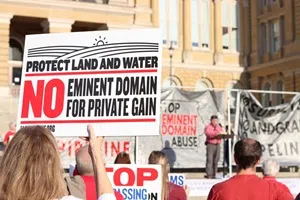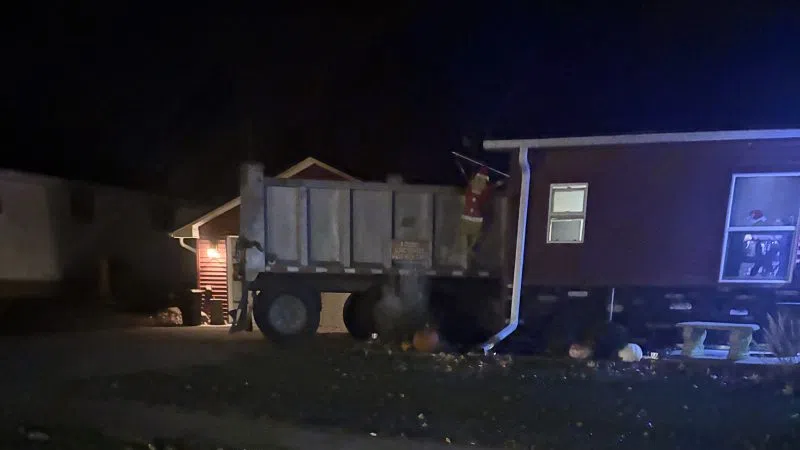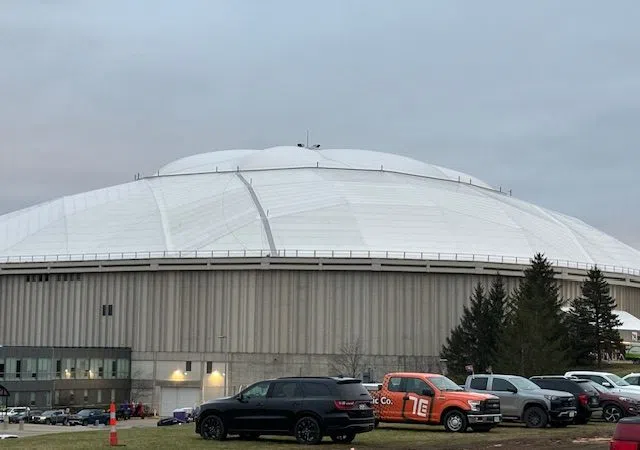Story and Photo by Cami Koons – Iowa Capital Dispatch
Iowa Supreme Court justices and an uncommonly large audience heard oral arguments Tuesday on the constitutionality of an Iowa law that allows a carbon pipeline company to enter and survey a Hardin County landowner’s property.
“We can’t allow Iowa landowners to be subjected to the mere convenience of a for-profit company intruding on their land against their will,” said Brian Jorde, the attorney who represented the affected landowner, following the hearing. “I don’t know if that point was getting across to (the justices).”
Iowa Supreme Court justices heard arguments in the historic Iowa Supreme Courtroom at the Iowa State Capitol, which was filled with attendees who overflowed to two additional rooms at the Capitol.
The district court in Hardin County ruled in May 2023 that landowner Kent Kasischke could not interfere with Summit Carbon Solutions’ attempts to enter his land to survey for its pipeline project. The company plans to build a pipeline that would transport sequestered carbon dioxide from ethanol plants to underground storage in North Dakota.
Kasischke is appealing the Hardin County decision on the argument that it is unconstitutional for a pipeline company to undertake land surveys and examinations before it is vested with eminent domain.
“You wouldn’t want someone just roaming around your backyard, just for the heck of it, and that’s what this statue really allows,” Jorde said.
The Iowa Utilities Commission issued a permit in August and granted eminent domain to Summit Carbon Solutions for the initial phase of the project of nearly 700 miles of pipeline through Iowa. Summit Carbon did not have the ability to condemn property when the dispute over surveying in Hardin County initially occurred.
“You can not have a pre-condemnation survey exercised by an entity that does not have condemnation, and is not vested with the power of eminent domain,” Jorde said in oral arguments.
Justices questioned Jorde on the scope of the surveys that are permitted and how other entities, like a utilities company, conduct surveys for easements.
Jorde argued that the Iowa statute is too broad and allows entities to perform “anything, anytime, invasive or otherwise.”
He asked the court to find Iowa Code 479B.15 unconstitutional or to at least narrow the scope of surveys to be “minimally invasive,” as he said the Supreme Court did in South Dakota.
Ryan Koopmans represented Summit Carbon Solutions in the oral arguments and said the law could not be considered unconstitutional unless it would be “unconstitutional under any application, under any set of facts.”
“If we were to hold that this statute was an unconstitutional taking, what effect would it have on all the other Iowa statutes that allow survey access for private and governmental entities?” Justice Thomas Waterman asked.
Koopmans said it would be an “on or off switch.”
“If we don’t have it, then Iowa (Department of Transportation) doesn’t have it, railroads don’t have it, electric utilities don’t have it,” Koopmans said.
He said without the statute, companies and entities would have to go through the condemnation process just to survey the land to see if it fit a proposed project.
Summit asked the court to uphold the district court’s ruling that granted its injunction to enter Kasischke’s land for the purposes of surveying. Koopmans clarified that an injunction is not guaranteed by the law, but that because of the landowner’s refusal and the determinations of the district court, “an injunction is warranted.”
The Supreme Court has until the end of its term in June to make a decision on the case, though it will likely come sooner.













